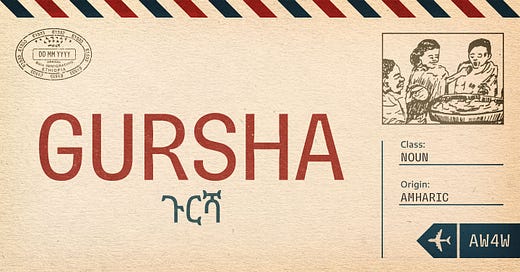I was first introduced to “gursha” - that intimate expression of Ethiopian hospitality - in a restaurant famous for its meanness. The restaurant was called Chane’s. Its 71-year-old eponymous owner was rumored to have served in the royal kitchen of Haile Selassie, and he’d be damned if he was going to suffer anything as lowly as your order. You ate what he made, the way he made it, and if you held up the line he might toss you out. Like a real-life version of the Seinfeld “Soup Nazi,” Chane was loved and feared. His stew was legend.
I remember one visit to Chane’s accompanied by an Ethiopian colleague and his wife, Bezawit Tadesse, a petite, lovely woman who arrived in a business suit and colorful scarf. The conversation turned to the Ethiopian custom of “gursha,” or being fed by another’s hand. Did I want to try?
I immediately said yes. I was curious. But when the food arrived — a large metal plate lined with injera and heaped with spicy beef — I got tense and unsure. I watched Beza dive in with her tiny fingers and wondered how to play my part. Should I tilt my head back, like a baby bird expecting a worm? Let my mouth drop open, like a ventriloquist dummy? My mind flashed back to St Paul’s Church, where as a kid I watched my friend Paul Daniels stick out his tongue for a communion wafer placed gently and efficiently by the priest. This, I imagined, would be the cultural equivalent. An exchange of tradition, heavy in symbolism, if not in substance.
That’s not what happened. The fist-size payload of injera and spicy beef that came fast at my face was way larger than anything I expected. I flung open my mouth just in time to let Bezawit stuff it in there, and I had to work hard not to let food escape down my chin. Even more unexpected than the size of the bite was the experience of having a stranger’s fingers so close to my mouth. The best I can compare it to is a trust fall, the kind you do at a team retreat or something, where they tell you to stay stiff and tip backwards into your colleagues’ waiting arms. Gursha seemed to require the same awkward surrender, the same giddy relinquishing of control. Swallowing, I stared into Bezawit’s big laughing eyes as she said, “you know that Ethiopians always do things in threes,” and put her hand back in the collective plate. I readied myself for two more mammoth bites.
Last week, I posted about Tamana, a Malagasy word that defies direct translation. So then I thought, why not post about ‘gursha’ - another hospitality-themed word with no direct equivalent, a word that’s most foreign in its over-familiarity, its crossing of boundaries, in comparison to which even a sloppy backyard BBQ feels like a state dinner? I called up Bezawit, who now lives with her husband and their two children in The Netherlands. I wanted to know what my gursha experience was like for her — if she even remembered it. But I began by asking her about the gursha itself. The word gursha literally means “mouthful,” why was hers so super-sized?
Bezawit: So there’s a saying in Amharic, the gursha should be a bit bigger than the normal bite. So you can show your affection. And me, I have very tiny hands… I don’t know if this is relevant for your story, but my father, he’s no longer here on earth with us, he used to say, how are you able to make that big gursha with your small hand?
GW: How old were you when you started making gursha for your dad?
Bezawit: Oh young. 13, 14. My father would sit on the sofa and say, ‘you have the best gursha. Feed me.’ I understand his proportion of injera and stew, how he likes it. That’s why he favors it. And now I also feed my kids. They say, mom, feeding tastes much better when we eat from your hands. So I’m like, ok, that’s my soft spot, let’s feed each other.
GW: Does anyone ever give you a gursha?
Bezawit: Um…. (long pause) I mean, they try. They’re not as professional or as expert as I am. (Laughs.)
GW: I’m curious about your technique.
Bezawit: The technique is actually for some people, it’s [understanding] the proportion of injera - the pancake - and the stew. Some people like it to be moist. Some people like it to be dry. It differs from one person to another.
GW: Do you remember anything about the gursha you gave me? I know it was like 9 years ago.
Bezawit: It was minced beef, if I remember.
GW: Wow, I can’t believe you remember that.
Bezawit: Yeah, but I think it was too spicy. You were like sweating.
GW: That’s what you remember about me? That I was sweating? That you were like, ok next time I got to add more injera for this guy to make it less spicy?
Bezawit: Exactly. That’s precisely… if I put too much of the sauce, it would not work for you.
GW: Can I admit something? I think the sweatiness… I mean I really like spicy food. I think it might have been more nervousness. Because I’d never had a gursha before. And it felt like it almost crossed a line. Not in a bad way. It crossed a line that doesn’t normally get crossed.
Bezawit: I understand. It would be an odd thing at first. Like a boundary thing. I would also imagine because you’re used to eating with fork and spoon and knife, and then now you’re eating with your hand, not only are you eating with your hand, but someone else is coming and.. intervening into your sovereign territory and feeding you in the mouth. I could imagine that being a huge experience.
GW: I’m curious what gursha means for you now that you’ve been in the Netherlands for almost four years. Personal space is a big deal in Dutch culture.
Bezawit: It is! It is. Yes. For example, let’s say I’m at work, and I take my lunch and say to someone, ‘let’s eat together.’ Even if it’s just a gesture [of sharing my food with someone else]. You’d be side eyed, like, ‘what’s the matter with her?’ Nobody offers that. Nobody wants that.
GW: So nobody even wants to share your food let alone let you feed them.
Bezawit: Exactly.
GW: So you haven’t done any gursha with anyone in the Netherlands except with your family?
Bezawit: We had a few guests coming in, of course, as an Ethiopian, the first thing we talk about is how good our food is, we want to show our music, and the coffee, anybody that is facing a foreigner is the ambassador of their country. And there was this lady I remember she was struggling to eat with her hands. Of course, until you know how to properly eat with your hand. And I said, “Can I feed you?” In Ethiopia, you don’t ask permission for gursha you just come and feed each other, but here you have to say, can I feed you. And I explained to her what gursha is.
I didn’t do the big bite. I gave her a normal bite. And she says, yours tastes better than mine. What am I doing wrong? And I said it’s the proportion. She said, it feels like I’m tasting from a different platter. I said, because I’m giving it to you with love. So it tastes better. She said, Oh that explains it. So yeah, that was a very good encounter that I had.
GW: Do you feel like it’s fair to call the gursha like a trust fall for food?
Bezawit: For me it’s more than a trust fall. It’s like an energy that is transferred from one person to another. That creates a certain bond. So you become mindful of what you’re eating. And what you’re feeding. It’s a way of being present. It’s about being grateful for what you have and then you share it. And you create - on a daily basis you create that memory.
What traditions help create
food memories for you? Let us know in the comments below.
Win a free year of paid posts! Share your ‘untranslatable’ word.
Ever noticed that features on ‘untranslatable’ words - global words for emotions and experiences with no equivalent in the English language - almost never speak to a regular person who lives and loves that word? Help me change that. Email me a short voice memo about your favorite non-English word. Why is it hard to translate? And why is it worth the time to unpack? Or fill out this brief five question survey. If your word is chosen for a post, you’ll get a complimentary year of Rough Transition paid posts, subscriber-only livestreams and 2025 meet-ups.








Hi,
I'm originally Tamilian from the Indian state of Tamil Nadu. This practice exists in other Indian states as well. This would happen every day when we were little children visiting cousins during the summer holidays over lunch and sometimes dinner. A grandma or mom would sit in the middle with a mixed bowl of rice with curd ("thayir sadam") and sides of vegetables or lentil stew ("sambar"). The kids would sit in a semi circle around her. She would make a round ball of curd rice and place it on a child's hand, make a dent and place some vegetable or sambar in there. Every child got the same. It was a shared sense of community. Bonus if the grandma ("Patti") told us a story.
Gursha in Tamil translates roughly to " utharathu" - in my family at least. I distinctly remember being fed by both mom and dad at different stages of my life. It's a symbol of love.
Here's more from Arun Venugopal https://www.npr.org/sections/thesalt/2014/04/10/301419534/is-everything-more-delicious-when-you-eat-with-your-hand?ft=nprml&f=301419534
Thanks,
Kalpana
I never had the proper words to express how eating from your hand does actually make it taste much better. "And she says, yours tastes better than mine. What am I doing wrong? And I said it’s the proportion. She said, it feels like I’m tasting from a different platter. I said, because I’m giving it to you with love." encapsulate it perfectly!